C developers are the backbone of system-level programming and embedded systems. They work on developing and maintaining software that interacts closely with hardware, ensuring performance and efficiency at the core level.
C development skills include a strong understanding of the C programming language, memory management, and debugging, as well as abilities like analytical thinking and attention to detail.
Candidates can write these abilities in their resumes, but you can’t verify them without on-the-job C Developer skill tests.
In this post, we will explore 9 essential C Developer skills, 11 secondary skills and how to assess them so you can make informed hiring decisions.
Table of contents
9 fundamental C Developer skills and traits
The best skills for C Developers include C Programming, Memory Management, Pointers, Data Structures, Algorithms, Debugging, Concurrency, Standard Library and System Calls.
Let’s dive into the details by examining the 9 essential skills of a C Developer.
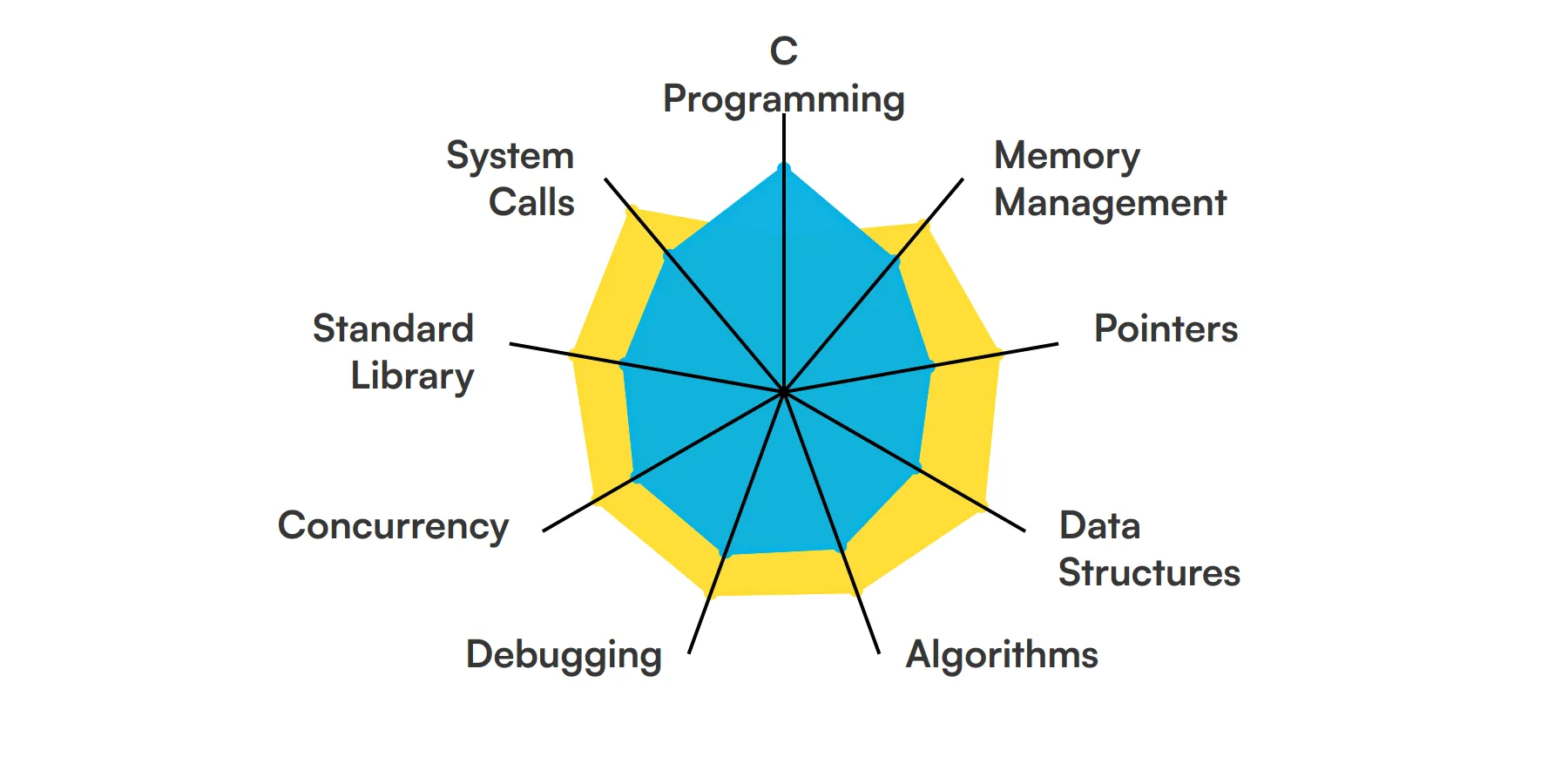
C Programming
A C Developer must have a strong grasp of C programming language. This includes understanding syntax, data types, and control structures. Mastery of C allows developers to write efficient and effective code for various applications.
For more insights, check out our guide to writing a C Developer Job Description.
Memory Management
Memory management is crucial for a C Developer. This involves allocating, deallocating, and managing memory in applications. Proper memory management ensures that programs run smoothly without leaks or crashes.
Pointers
Understanding pointers is essential for any C Developer. Pointers allow direct manipulation of memory addresses, which is a powerful feature in C. This skill is used for dynamic memory allocation and efficient array handling.
Data Structures
Knowledge of data structures like arrays, linked lists, stacks, and queues is fundamental for a C Developer. These structures are used to organize and store data efficiently, which is critical for developing complex applications.
Check out our guide for a comprehensive list of interview questions.
Algorithms
A C Developer should be well-versed in algorithms. This includes sorting, searching, and other algorithmic techniques. Understanding algorithms helps in writing optimized code that performs well under various conditions.
Debugging
Debugging is a key skill for a C Developer. It involves identifying and fixing bugs in the code. Proficiency in debugging tools and techniques ensures that the final product is reliable and free of errors.
Concurrency
Concurrency is important for a C Developer working on multi-threaded applications. This skill involves managing multiple threads and processes to ensure efficient execution. Proper handling of concurrency can significantly improve application performance.
Standard Library
Familiarity with the C Standard Library is essential. It provides a set of built-in functions for handling input/output, string manipulation, and more. Utilizing the standard library can save time and improve code quality.
System Calls
Understanding system calls is important for a C Developer, especially when working on low-level programming. System calls allow interaction with the operating system, enabling tasks like file manipulation and process control.
11 secondary C Developer skills and traits
The best skills for C Developers include Version Control, Makefile, Cross-Platform Development, Embedded Systems, Networking, Unit Testing, Shell Scripting, Code Optimization, Documentation, Continuous Integration and API Development.
Let’s dive into the details by examining the 11 secondary skills of a C Developer.
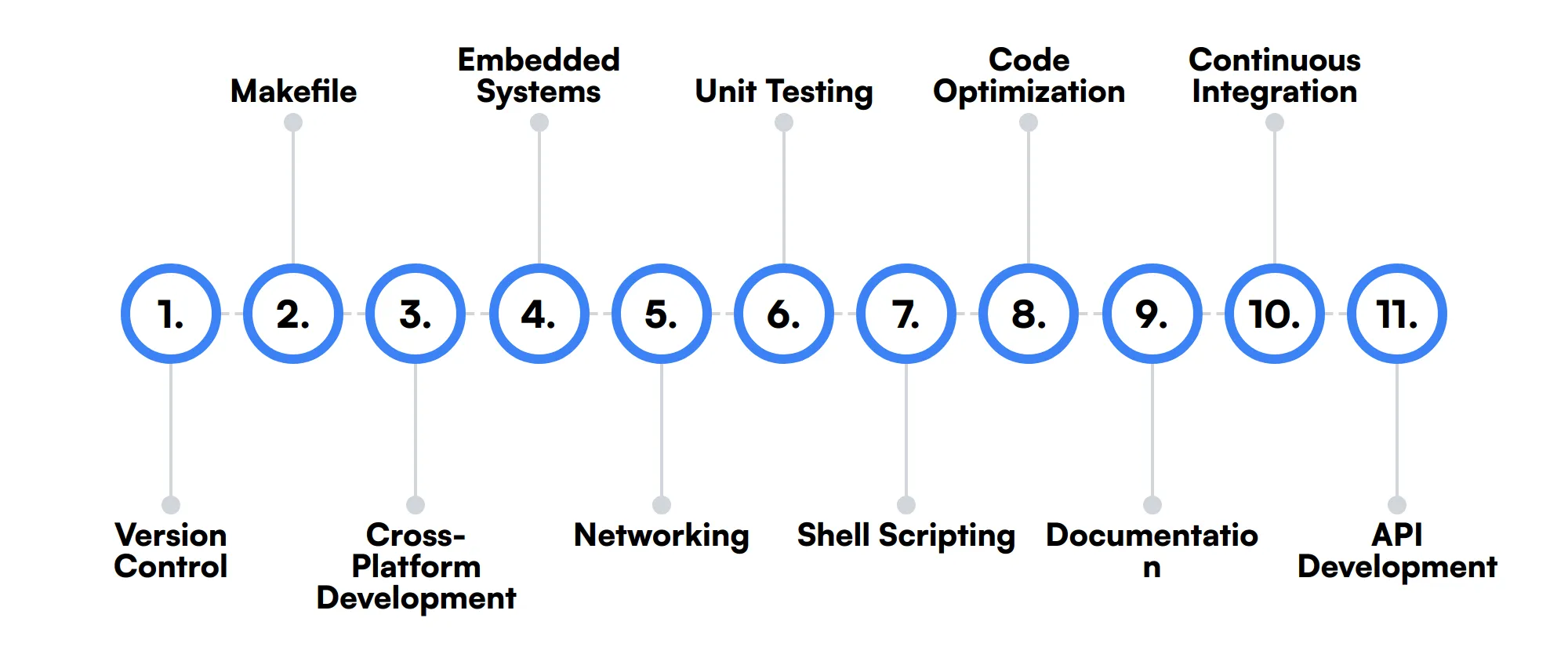
Version Control
Knowledge of version control systems like Git is beneficial. It helps in tracking changes, collaborating with team members, and managing code versions effectively.
Makefile
Understanding Makefile is useful for automating the build process. It allows a C Developer to compile and link programs efficiently, ensuring that all dependencies are correctly managed.
Cross-Platform Development
Experience with cross-platform development can be advantageous. It involves writing code that runs on multiple operating systems, broadening the reach and usability of the application.
Embedded Systems
Knowledge of embedded systems is valuable for a C Developer working on hardware-related projects. This includes programming microcontrollers and understanding hardware-software interactions.
Networking
Basic understanding of networking concepts can be helpful. This includes knowledge of sockets, protocols, and network communication, which is useful for developing networked applications.
Unit Testing
Familiarity with unit testing frameworks is beneficial. It involves writing tests for individual units of code to ensure they work as expected, improving code reliability and maintainability.
Shell Scripting
Knowledge of shell scripting can be useful for automating tasks and managing development environments. It allows a C Developer to write scripts for repetitive tasks, saving time and effort.
Code Optimization
Skills in code optimization are important for improving the performance of applications. This involves analyzing and refining code to make it run faster and use fewer resources.
Documentation
Good documentation practices are essential for maintaining code. This includes writing clear comments and creating comprehensive documentation to help others understand and use the code effectively.
Continuous Integration
Experience with continuous integration tools can be beneficial. It involves automating the process of code integration, testing, and deployment, ensuring that the codebase remains stable and up-to-date.
API Development
Knowledge of API development is useful for creating interfaces that allow different software components to communicate. This skill is important for building modular and scalable applications.
How to assess C Developer skills and traits
Assessing the skills and traits of a C Developer can be a challenging task, given the depth and breadth of knowledge required in this field. It's not just about knowing the syntax of the C programming language; it's about understanding how to manage memory, use pointers effectively, and implement complex data structures and algorithms. These developers must also be adept at debugging, handling concurrency, and making system calls, all while leveraging the standard library to its fullest potential.
Traditional resumes and interviews often fall short in evaluating these competencies comprehensively. This is where skills-based assessments come into play. By using targeted tests, you can get a clear picture of a candidate's abilities and how they apply their knowledge in real-world scenarios. Adaface assessments are designed to help you achieve this, offering a 2x improved quality of hires and an 85% reduction in screening time. These assessments can be tailored to focus on the key skills that are most relevant to your specific needs, ensuring you find the right fit for your team.
Let’s look at how to assess C Developer skills with these 4 talent assessments.
C Online Test
Our C Online Test evaluates candidates' proficiency in fundamental C programming concepts. This includes their ability to work with variables, data types, control structures, and functions.
The test assesses their understanding of C programming, variables and data types, operators, control structures, functions, arrays, strings, pointers, structures and unions, and file handling. It includes a mix of MCQs and coding questions to gauge both theoretical knowledge and practical skills.
Successful candidates demonstrate a strong grasp of dynamic memory allocation, preprocessor directives, and macros. They also show proficiency in handling complex data structures and file operations.
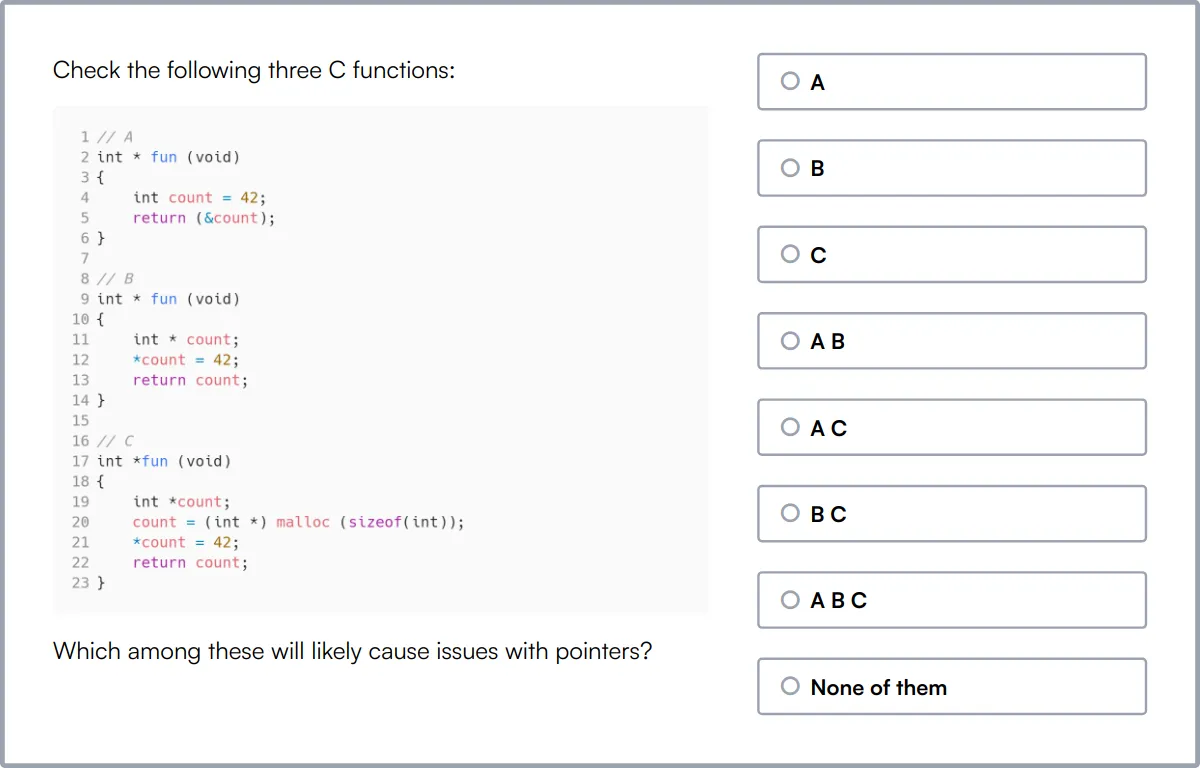
Embedded C Online Test
Our Embedded C Online Test assesses a candidate's ability to develop C/Embedded C drivers and libraries. It evaluates their skills in both basic and advanced Embedded C programming concepts.
The test covers C basics, Embedded C basics, pointers, bit operations, I/O in C, object-oriented principles, internals of assembler and compiler, debugging and error handling, compiler optimization, cross-compiling toolchains, header protection, and booting sequence. It includes scenario-based MCQs and coding questions.
High-scoring candidates show proficiency in applying object-oriented programming principles to firmware development and demonstrate a deep understanding of hardware addressing and fixed-point arithmetic operations.
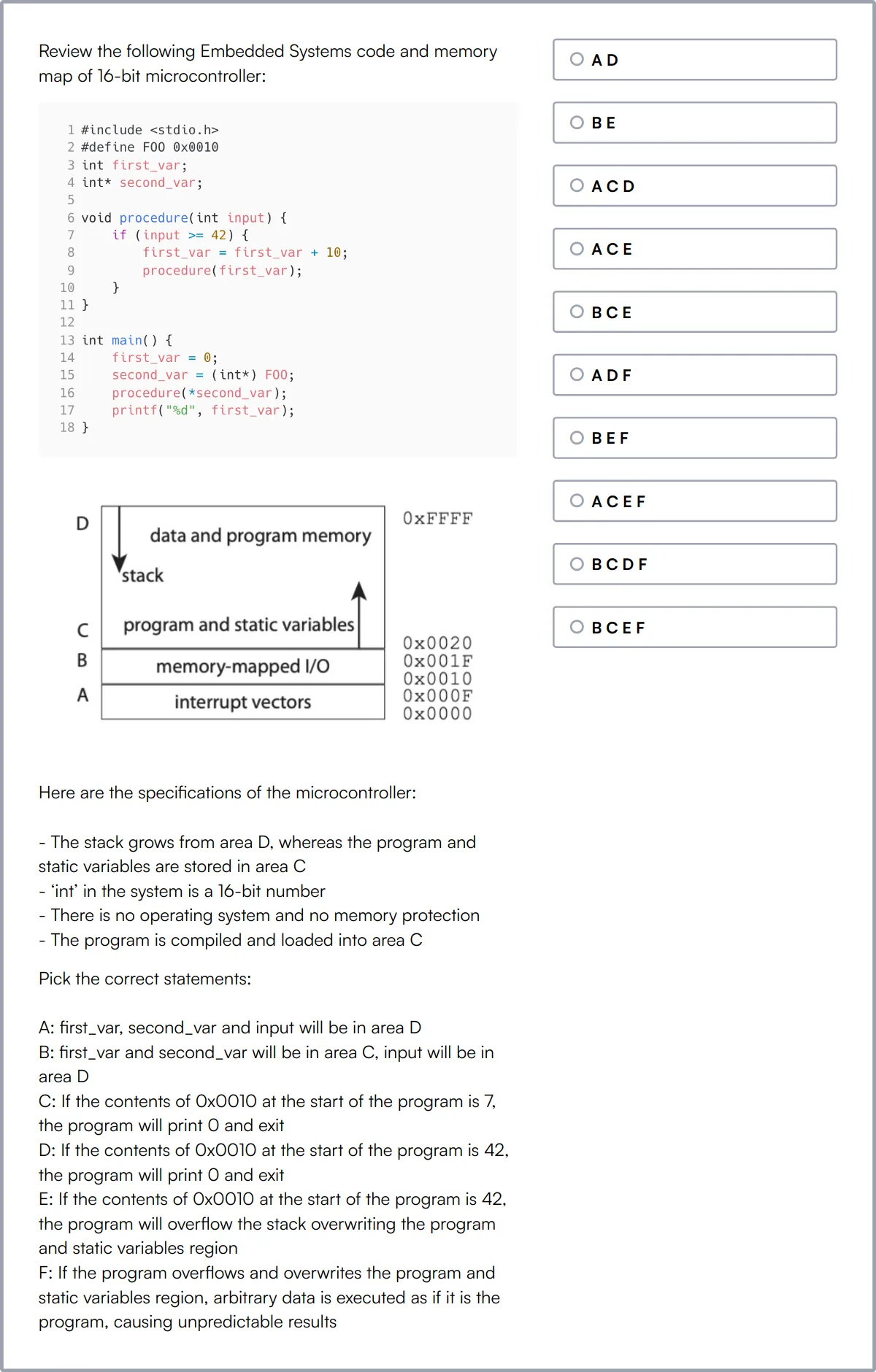
Software Engineering Online Test
Our Software Engineering Online Test evaluates candidates on core computer science concepts. This includes their understanding of data structures, algorithms, databases, and programming paradigms.
The test covers object-oriented programming, database design, algorithms and data structures, testing and quality assurance, web development, software security, and code optimization. It includes scenario-based MCQs and a coding question to assess problem-solving and hands-on programming ability.
Successful candidates demonstrate a strong grasp of design patterns and software security principles. They also show proficiency in optimizing code and ensuring high-quality software through rigorous testing.
Linux Online Test
Our Linux Online Test evaluates candidates' knowledge of the Linux operating system. It assesses their proficiency in using Linux commands, file system management, and networking.
The test covers Linux command line, file system management, process management, networking, security, package management, and shell scripting. It uses scenario-based MCQs to evaluate practical skills and theoretical knowledge.
High-scoring candidates demonstrate a strong understanding of Linux administration and the ability to design and maintain Linux-based systems. They also show proficiency in shell scripting and managing Linux security.
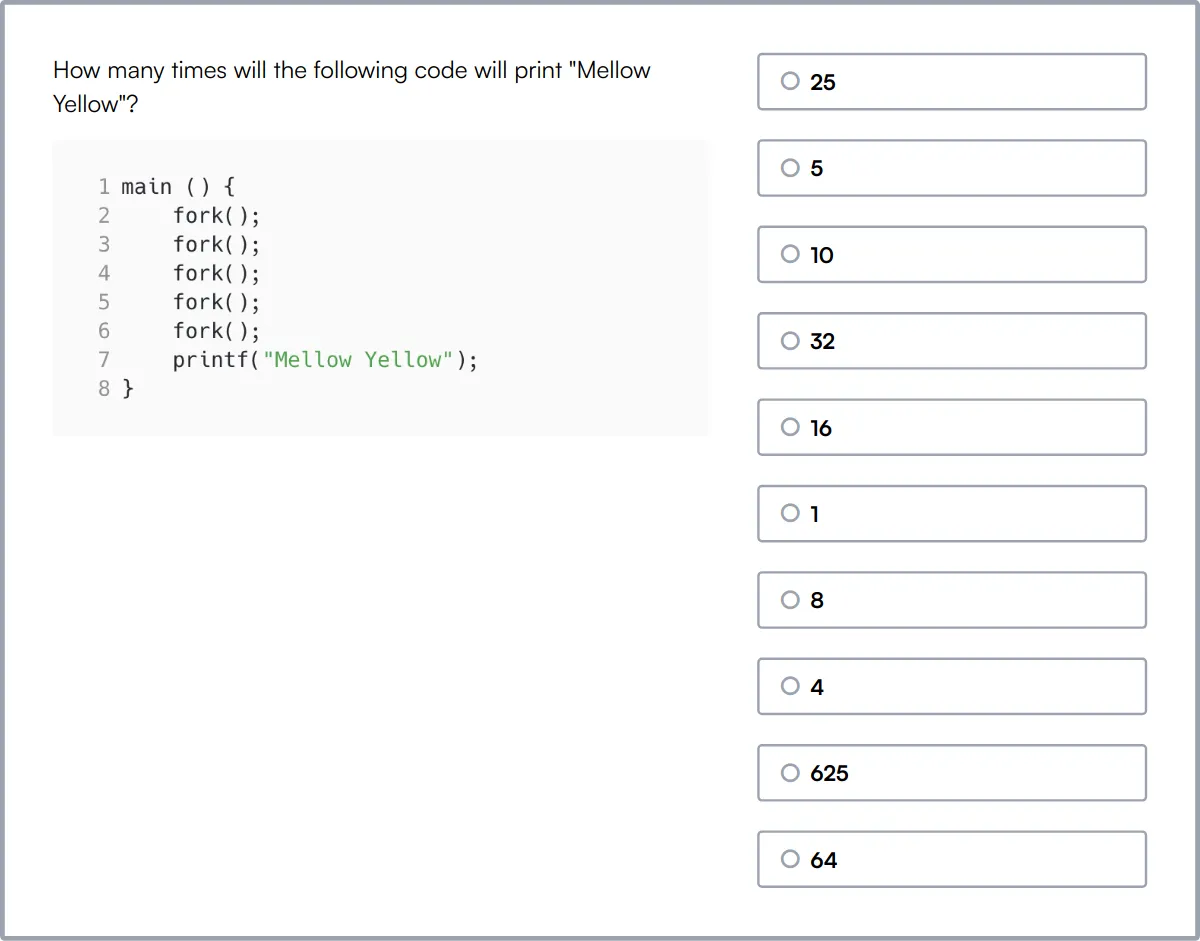
Summary: The 9 key C Developer skills and how to test for them
| C Developer skill | How to assess them |
|---|---|
| 1. C Programming | Evaluate proficiency in writing and understanding C code. |
| 2. Memory Management | Assess ability to manage dynamic memory allocation and deallocation. |
| 3. Pointers | Check understanding and correct usage of pointers and pointer arithmetic. |
| 4. Data Structures | Gauge knowledge of implementing and using data structures in C. |
| 5. Algorithms | Evaluate problem-solving skills using algorithmic techniques. |
| 6. Debugging | Determine capability to identify and fix bugs in C programs. |
| 7. Concurrency | Assess understanding of multi-threading and concurrent programming. |
| 8. Standard Library | Check familiarity with C standard library functions. |
| 9. System Calls | Evaluate knowledge of using system calls for low-level operations. |
C Online Test
C Developer skills FAQs
What are the key skills to look for in a C Developer?
Key skills include C programming, memory management, pointers, data structures, algorithms, debugging, and concurrency. Familiarity with the standard library, system calls, and version control is also important.
How can I assess a candidate's proficiency in C programming?
You can assess proficiency through coding tests, technical interviews, and reviewing past projects. Look for a deep understanding of syntax, semantics, and problem-solving abilities.
Why is memory management important for C Developers?
Memory management is crucial because C does not have automatic garbage collection. Developers must manually allocate and deallocate memory, which requires careful handling to avoid leaks and crashes.
What is the role of pointers in C programming?
Pointers are used to store memory addresses and are essential for dynamic memory allocation, array manipulation, and efficient function arguments. They are a core concept in C.
How do you evaluate a candidate's debugging skills?
Evaluate debugging skills by asking candidates to solve buggy code during interviews. Check their familiarity with debugging tools like GDB and their approach to identifying and fixing issues.
What is the significance of Makefile in C development?
Makefile is used to automate the build process. It defines how to compile and link the program, making it easier to manage complex builds and dependencies.
How important is cross-platform development for C Developers?
Cross-platform development ensures that code runs on different operating systems. It is important for creating versatile applications and requires knowledge of platform-specific nuances.
What should I look for in a candidate's experience with embedded systems?
Look for experience with low-level programming, real-time operating systems, and hardware interfacing. Knowledge of specific microcontrollers and development tools is also beneficial.

40 min skill tests.
No trick questions.
Accurate shortlisting.
We make it easy for you to find the best candidates in your pipeline with a 40 min skills test.
Try for freeRelated posts
Free resources



